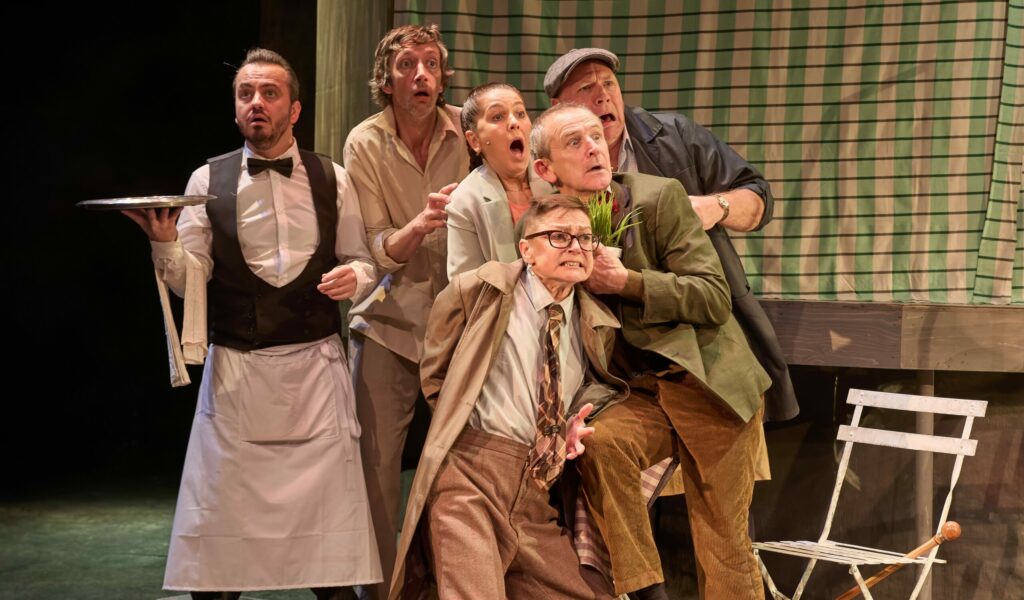Matthaus Bridge reviews Manon Steffan Ros’ Welsh language production of Eugène Ionesco’s Rhinoceros at the Sherman Theatre.
Romanian-French playwright Eugène Ionesco’s absurdist production Rhinoceros was first performed in Germany in 1959. Fast forward over half a century later, Rhinoseros, the very first Welsh language adaptation directed by Steffan Donnelly makes its debut at the Sherman Theatre.
Renowned Welsh author Manon Steffan Ros’ Welsh language adaptation of Eugène Ionesco’s play is a captivating and thoroughly entertaining production marked by dark humour and self-reflection.
First performed in 1959, Rhinoceros was Eugène Ionesco’s dramatic interpretation of the political reality surrounding him at the height of National Socialism in Romania, as he witnessed mass extremism and fascism rising over central Europe. Since its debut, Rhinoceros has been a source of discussion and self-reflection for modern-day audiences. Manon Steffan Ros’ Welsh language adaptation invites the audience to follow suit and engage in reflection on humanity and social-order.
The writer makes a number of references to Welsh culture and has cleverly adapted the production to not only resonate with its audience, but to create a local atmosphere in its absurdity.
Rhinoceros is often associated with the Theatre of the Absurd, a designation used to depict the creations of French playwrights from 1940 to late 1960s. Originally set in a small French village, the play follows the story of one man’s resistance to conformity, as everyone around him begins to turn into rhinos. Ros’ retelling transposes the play to a quaint little village in Wales. The writer’s Welsh twist creates a feeling that we, the audience, are members of the village by occasionally breaking the fourth wall. The writer makes a number of references to Welsh culture and has cleverly adapted the production to not only resonate with its audience, but to create a local atmosphere in its absurdity. Although its message wasn’t lost on me, it has left me pondering on one particular question: does a South Walian rhino have one hump or two?
Rhodri Meilir takes the reins as our unlikely hero Bérenger, a down-and-out alcoholic who faces a crisis of identity and belonging. Meilir’s stage presence is commanding up to the very end, culminating with his powerful monologue on his existence and life’s purpose in the final act. Bérenger’s inner transformation is less eye-catching but cuts as deep as that of those around him. During the three acts, his character moves from denial to love, and from panic to fearlessness. In times of crisis and mass conformity, he seems to stand as a symbol of hope for humanity to better itself and stand up for its beliefs. Rhodri Meilir does a fantastic job portraying him.
The narrow stage and cramped set design creates an unnerving feeling of anxiety and tension, especially during the final two acts. As the rhinos descend onto the streets, the vibrations of trampling feet shiver through the audience.
Bethan Ellis Owen stands out as Bérenger’s best friend, Sian. Although both are polar opposites, their bond is a powerful and dynamic one. Their friendship is like any other, filled with laughter, argument, and reconciliation; but can it withstand one of them turning into a rhino? Following the point of metamorphosis, the star-studded cast including Ioan Gwyn, Eddie Ladd and Glyn Pritchard play a variety of characters from journalists to shopkeepers before their untimely demise.
The narrow stage and cramped set design creates an unnerving feeling of anxiety and tension, especially during the final two acts. As the rhinos descend onto the streets, the vibrations of trampling feet shiver through the audience. Director Steffan Donnelly, set and costume designer Cai Dyfan, and composer Dyfan Jones excellently combine a small amount of space and ambient sound to create the illusion. Facing the centre of the theatre, I found myself feeling agitated as one rhino passed another. Special credit goes to Steffan Donnelly’s team for the metamorphosis scenes; more specifically, the tension that builds up to Bethan Ellis Owen’s transformation. The actors scatter thick grey paint over their bodies, revealing their fate as they tear each item of clothing away. Ultimately, it seems, nobody is safe from what’s happening in the village. Regardless of who you are or what you do, eventually, all seem bound to succumb to the temptation of following the herd-like cult that surrounds you.
Rhinoseros will be touring until 18 November 2023.
All articles published on the welsh agenda are subject to IWA’s disclaimer. If you want to support our work tackling Wales’ key challenges, consider becoming a member.




